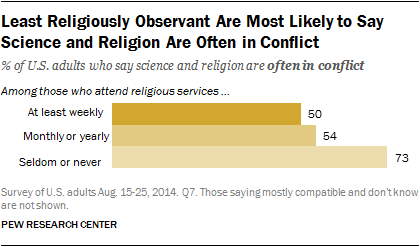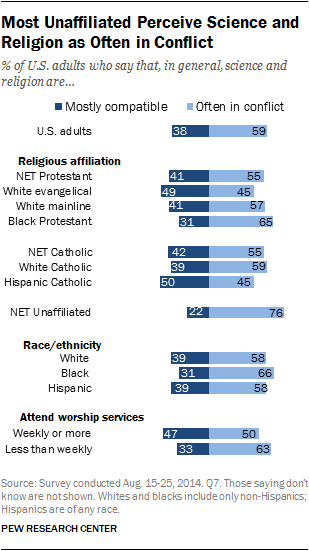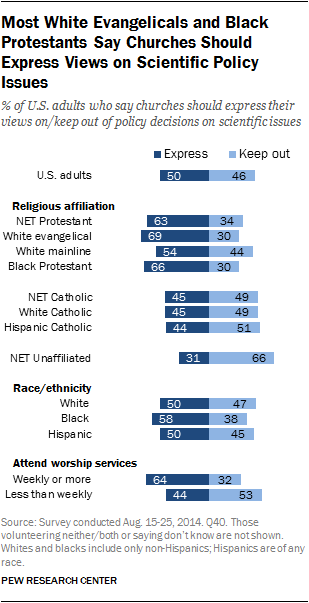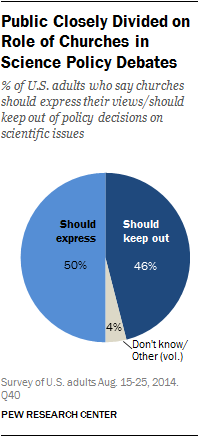The more you go to church, the less likely you are to see science and religion as incompatible, according to the latest Pew Research Center survey.
Half of Americans who attend religious services weekly said science and religion are often in conflict, less than the 54 percent who attend monthly or yearly, and far less than the 73 percent who seldom or never attend.
“It is the least religiously observant Americans who are most likely to perceive conflict between science and religion,” stated lead author Cary Funk in today's report.
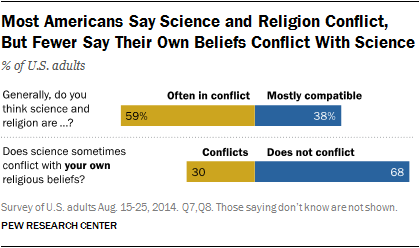
White evangelicals are especially likely to say that science is compatible with faith: almost half (49%) agree, compared with 38 percent of all US adults. About three in ten (31%) black Protestants (two-thirds of whom identify as evangelical according to past Pew research), also said science and religion are mostly compatible.
But while almost 60 percent of Americans think science and religion often conflict, only 30 percent think science conflicts with their own religious beliefs, down from 36 percent in 2009. The drop was driven by the religiously affiliated, which fell from 41 percent to 34 percent; the religiously unaffiliated, or so-called “nones,” stayed constant at 16 percent.

“People’s sense that there generally is a conflict between religion and science seems to have less to do with their own religious beliefs than it does with their perceptions of other people’s beliefs,” Pew stated.
Evangelicals experience more personal conflict than the general public: 4 in 10 said their own beliefs sometimes conflicted with science. But even that number has decreased from 52 percent in 2009.

The biggest area of contention that respondents mentioned: creation and evolution. More than a third (36%) said religion collided with science over issues of creation, evolution, and Darwin. About a quarter (24%) said there were broad differences over the belief in God, existence of miracles, and view of whether man is actually “in charge.”
Only about 1 in 10 (11%) said abortion is an area of conflict, while another 7 percent thought science conflicted with religion in specific medical practices.
Indeed, religious persuasion affected just a few areas of science that Pew asked about. While those with a religious affiliation don’t think the world’s growing population is a problem, and while 6 in 10 of those who regularly attend worship services say genetic modification of babies is “taking medical advances too far,” religion didn’t affect opinions on other scientific topics including:
- Whether to allow access to experimental drug and medical treatments before they have been fully tested.
-
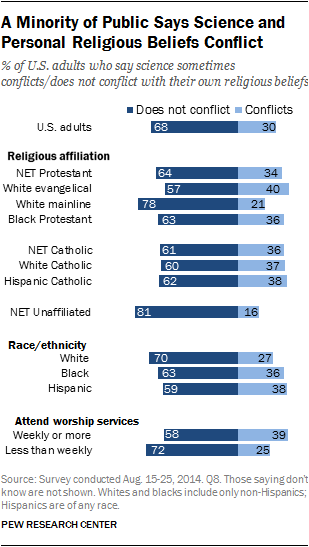
- The safety of genetically modified foods.
- Climate change.
- Space exploration.
- The long-term payoffs from government investment in science.
“Our analysis points to only a handful of areas where people’s religious beliefs and practices have a strong connection to their views about science topics and a surprising number of topics where religious differences do not play a central role in explaining their beliefs,” Funk said. “What is most striking is the multiple influences on people’s views.”
People’s opinions are shaped by generational divides, gender, educational attainment, and differences in knowledge about science, she said.
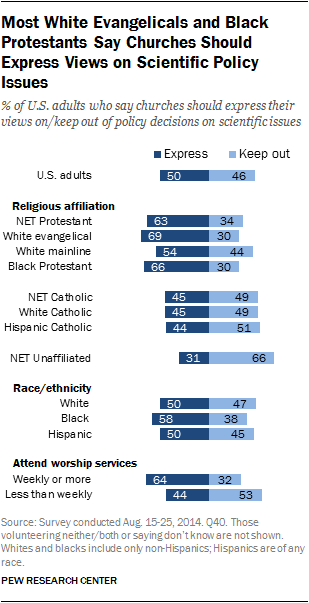
Evangelicals were more likely than the general public to say that humans have not evolved due to natural processes, and that the growing world population will not be a major problem. They were also somewhat likely to favor allowing more offshore drilling and oppose stricter power plant emission limits. They somewhat favor allowing parents to decide what to do about childhood vaccines.
Should religion play a larger role in public opinion on scientific issues? Most evangelicals (69%) and black Protestants (66%) said churches should be guiding views about scientific issues, while the general public is evenly split (50% in favor, 46% opposed) on whether churches should address science from the pulpit.
The latest GSS survey also examined evangelical views on science. The results were mixed.

- One-third (34%) of evangelicals had taken any college-level science course (slightly below the national average of 41%).
- More than half (55%) agreed that science makes our way of life change “too fast.” Most (80%) also said science and technology make our lives better.
- More than two-thirds (69%) said the universe did not begin with a huge explosion (such as the Big Bang), and three-quarters (76%) said human beings did not “develop from earlier species of animals.”
- Overall, about half of Americans (53%) said science is changing our way of life too fast; 82 percent said science is making our lives better. Half said the universe began with an explosion and that humans evolved from animals (53%).
CT’s past reporting on the relationship between science and faith includes extensive coverage of human origins, noting how most Americans—Christian and otherwise—do not fall neatly into creationist or evolutionist camps, how theologians view the debate, and how debates help (or hurt) the discussion.
[Image courtesy of Steve Rainwater – Flickr]



